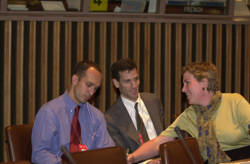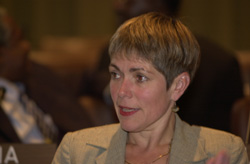 CANADA recommended noting that the PoA would be adopted at
UNFF-2. The US urged deletion of the entire section, saying it
causes confusion between the MYPOW and the PoA. The
G-77/CHINA, supported by NIGERIA, INDONESIA, BRAZIL, MALAYSIA,
GHANA, CHINA, COLOMBIA and SOUTH AFRICA, underscored the need
to retain the paragraphs on monitoring and assessing progress
and on the PoA.
CANADA recommended noting that the PoA would be adopted at
UNFF-2. The US urged deletion of the entire section, saying it
causes confusion between the MYPOW and the PoA. The
G-77/CHINA, supported by NIGERIA, INDONESIA, BRAZIL, MALAYSIA,
GHANA, CHINA, COLOMBIA and SOUTH AFRICA, underscored the need
to retain the paragraphs on monitoring and assessing progress
and on the PoA.
|
|
CROSS-CUTTING ISSUES:
|
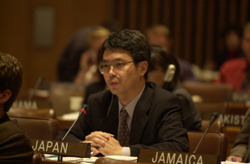
Regarding a paragraph identifying international trade and SFM,
financial cooperation, capacity building and technology transfer as
cross-cutting issues to be discussed at each session, the G-77/CHINA
reiterated its support for discussing trade. The EU, SWITZERLAND,
JAPAN and the REPUBLIC OF KOREA opposed.
|
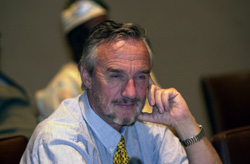
NORWAY proposed that major groups' participation be discussed and
ensured at each session. |
| |
| MONITORING, ASSESSMENT AND
REPORTING: |
| Regarding
information on the state of forests, the G-77/CHINA: supported
reference to the latest global reports on forests; proposed
deleting reference to effective decision-making; and proposed
adding language on making information accessible on financial
resources, ESTs and capacity building. |
|
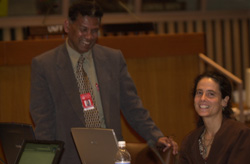
NEW ZEALAND added language calling on the CPF to promote and
support the use of criteria and indicators as a basis for country
reporting. Left photo: ENB writer Leila Mead with a delegate from
New Zealand.
|
| HIGH-LEVEL
SEGMENT: |
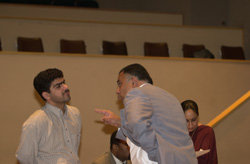
The G-77/CHINA requested reference
to the dates of the first ministerial meeting in Costa Rica, and
formally adopting the PoA during UNFF-2 as a contribution to the
World Summit on Sustainable Development. AUSTRALIA asked that a
CSD representative report on, inter alia, the relevance of
the UNFF to provide input to the Preparatory Committee for the
Summit. |
| |
| AD HOC EXPERT
GROUPS: |
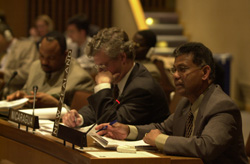
The G-77/CHINA
proposed language to reflect the intergovernmental character of
expert groups. The US proposed replacing text on groups on
monitoring and on the mandate of a legal framework, with "an
option of up to two additional ad hoc expert groups in the
biennium 2002-2003" and additional groups for the following
biennium, to be decided at UNFF-2. NEW ZEALAND (Right) opposed limiting
the number of expert groups. |
| |
| MULTI-STAKEHOLDER
DIALOGUES: |
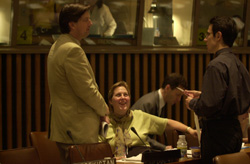
The US proposed
changing the title to "Multi-stakeholder dialogues and
transparent participatory processes." The EU preferred
"Participation of major groups," and proposed a
paragraph recognizing the importance of participation by all major
groups as defined in Agenda 21. Left photo: ENB writer Rado
Dimitrov with
members of the US delegation. |
| . |
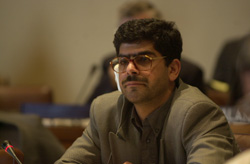
The G-77/CHINA
preferred dialogues associated with "the implementation of
SFM." Regarding a paragraph deciding that multi-stakeholder
dialogues be held at the beginning of each session on the
session's thematic focus, the US suggested dialogues be held
throughout each session. |
|
|
| DEVELOPING SYNERGIES AND
COORDINATION: |
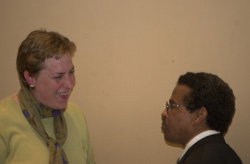
The US recommended
changing the section title to "Enhancing cooperation and
coordination." On a paragraph recalling ECOSOC resolution
2000/35, the G-77/CHINA, supported by the US, recommended using
the resolution's exact language, noting that the UNFF will seek
ways and means of strengthening synergies and coordination in
policy development and implementation of forest-related
activities. |
| REVIEW: |
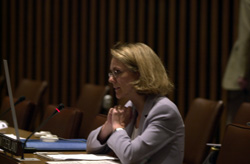 The
G-77/CHINA recommended deleting reference to criteria for success
and proposed a list of criteria for reviewing the effectiveness of
the UNFF, including effectiveness of, inter alia:
implementation of IPF/IFF proposals for action, the MYPOW and the
PoA; addressing cross-cutting issues; implementation of financial
and technological transfer and capacity building in developing
countries; and synergy between the UNFF and other international
bodies. The US said it was premature to establish criteria, and
proposed deleting related text. SWITZERLAND (Right) , echoed by CANADA,
supported elaborating and agreeing on criteria early in the
process, but said the specific criteria need to be discussed
further. The
G-77/CHINA recommended deleting reference to criteria for success
and proposed a list of criteria for reviewing the effectiveness of
the UNFF, including effectiveness of, inter alia:
implementation of IPF/IFF proposals for action, the MYPOW and the
PoA; addressing cross-cutting issues; implementation of financial
and technological transfer and capacity building in developing
countries; and synergy between the UNFF and other international
bodies. The US said it was premature to establish criteria, and
proposed deleting related text. SWITZERLAND (Right) , echoed by CANADA,
supported elaborating and agreeing on criteria early in the
process, but said the specific criteria need to be discussed
further. |


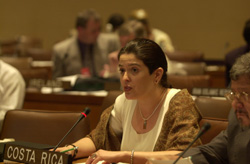
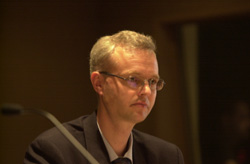
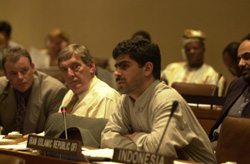
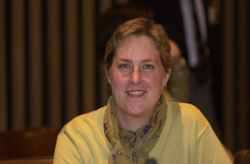
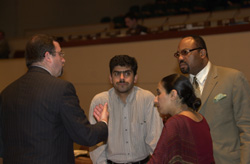
 The
EU, the US, SWITZERLAND, CANADA and NEW ZEALAND supported the
thematic focuses proposed in the Bureau's draft. However, the EU
opposed reference to LFCCs. He asked for clarification of
"institutional aspects of forests," and suggested adding
"cultural." In a remark echoed later by the US, he noted
disparities between the text and the attached table with the
proposed schedule.
The
EU, the US, SWITZERLAND, CANADA and NEW ZEALAND supported the
thematic focuses proposed in the Bureau's draft. However, the EU
opposed reference to LFCCs. He asked for clarification of
"institutional aspects of forests," and suggested adding
"cultural." In a remark echoed later by the US, he noted
disparities between the text and the attached table with the
proposed schedule.